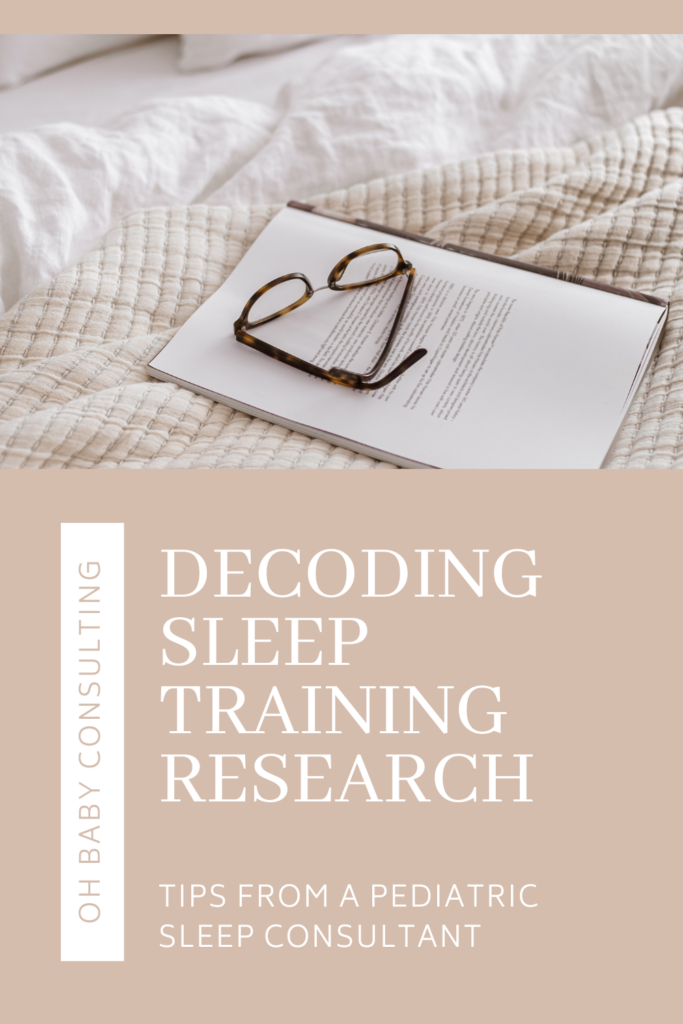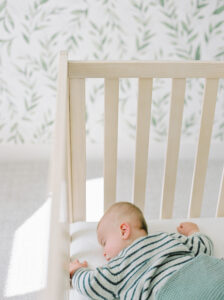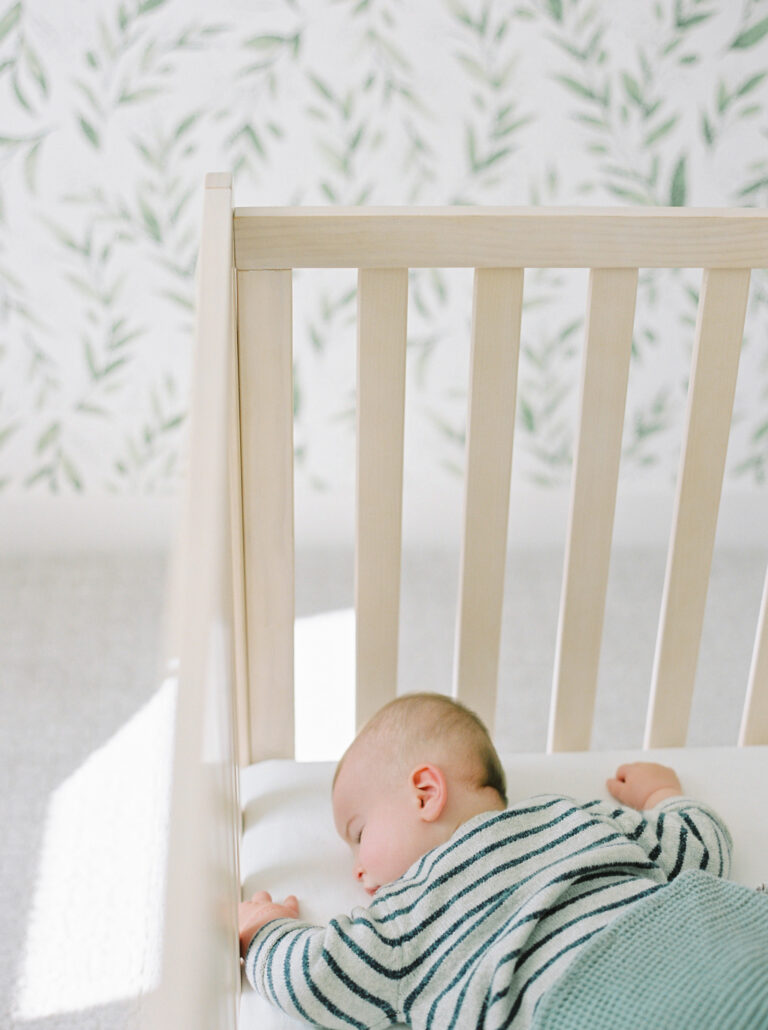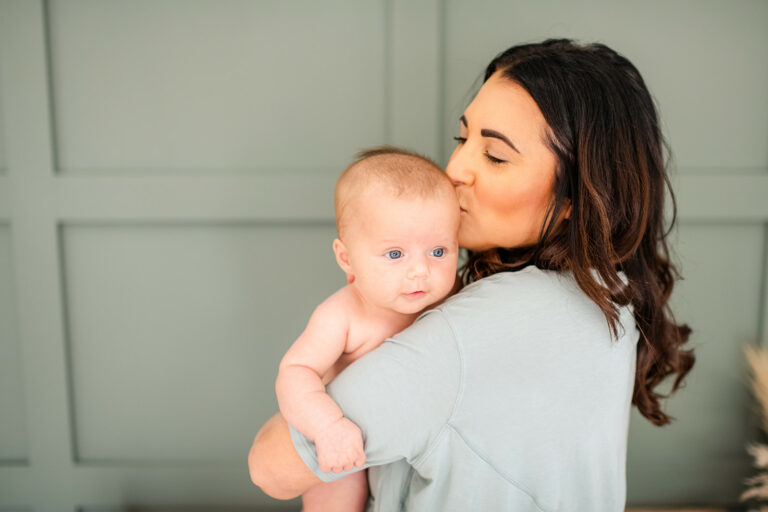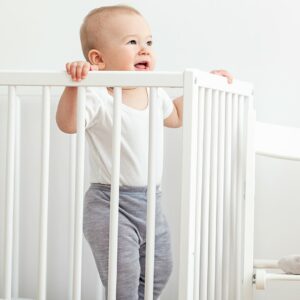The difficult but beautiful thing about parenting is that there is no rule book. Every family gets to choose what style of parents they want to be, what things are important to them, and how to navigate the journey in their own unique way.
The decision of whether or not to sleep train is a very personal one. There are many reasons parents choose to sleep train, and if you’re reading this, you may be trying to figure out if sleep training is the right path for you.
You can learn more about sleep training + various sleep training methods, here.
I am someone who typically uses research + data to inform my decisions (both personally and professionally). If you are also that type of person, then you’ll appreciate what’s coming. I’ve sourced, organized, and summarized much of the current research on sleep training and sleep-training-adjacent topics.
It is important to note, however, that there is a body of “research” out there that proposes to be about the harmful effects of sleep training but are actually either grossly misrepresented or incredible leaps from the study’s original conclusions. If you want to learn more about “sleep training studies” that have been debunked, you can read more here, and here.
Sleep Training Efficacy: Does Sleep Training Work?
While there are hundreds of thousands of anecdotal accounts of the efficacy of sleep training, what does the research say?
This study looked at the frequency of overnight wake ups and the responses from parents. Among other conclusions, the study found that, “…infants who were consistently put into the crib awake were more likely to be self-soothers than infants who were consistently put into the crib asleep. Infants who required parental assistance to fall asleep at the beginning of each night were more likely to require parental assistance upon awakening in the middle of the night.“
Key takeaway: Helping your child to sleep at bedtime increases the likelihood that you will need to help them back to sleep in the middle of the night. The inverse is also true: laying your child down awake increased the likelihood of them sleeping longer stretches without parental involvement.
This conclusion is one of the more consistent findings in infant sleep research. That is, the best predictors of the quality of nighttime sleep have to do with parental involvement at bedtime and in the middle of the night.
Babies who fall asleep on their own at the beginning of the night tend to sleep better during the night whereas babies who needed more active soothing from a parent had more disrupted overnight sleep. This finding has been consistent across countries and cultures with research from The United States, Canada, Thailand, and the 17 countries included in this cross-cultural study.
This study found that, “… Sleep training improves infant sleep problems, with about 1 in 4 to 1 in 10 benefiting compared with no sleep training, with no adverse effects reported after 5 years. Maternal mood scales also statistically significantly improved; patients with the lowest baseline depression scores benefited the most.”
Key takeaway: Sleep training works. It is especially impactful for those struggling with postpartum depression.
Safety + Long-Term Development: Is Sleep Training Safe + Does it Have Negative Impacts?
This study specifically looked at the long-term risks/benefits of sleep training on the child, the child-parent dyad (attachment relationship) and maternal outcomes.
Results showed that after 5 years, there were no differences between the intervention group (the sleep trained children) and the control group (the ones who didn’t sleep train).
Researchers concluded that, “Behavioral sleep techniques have no marked long-lasting effects (positive or negative). Parents and health professionals can confidently use these techniques to reduce the short- to medium-term burden of infant sleep problems and maternal depression.”
Key takeaway: When looking at the impacts of sleep training on the child, the parent-child relationship, and the mother, there are no lasting negative impacts. Sleep training is a valid + safe option.
This article cites several studies relating to sleep training. Of particular importance is the lack of evidence to support any claims of negative outcomes for babies. The only evidence that exists pointing to the damaging effects of prolonged crying comes from studies of long-term abuse and neglect. There are no studies citing negative effects of “…brief periods of crying in an otherwise loving family.”
The article also points out that there is a plethora of evidence of the “…serious long-term negative consequences of sleep deprivation, including depression, inattentiveness, and marital problems.” And for babies, we see sleep deprivation manifest itself in feeding issues, mood, attention, and learning. This is the case not only for not enough sleep but sleep that is too fragmented or disrupted.
Key takeaway: Sleep training does not have lasting negative effects, but chronic sleep deprivation can.
One study that has gained popularity in the anti-sleep training groups and has been circulated on social media platforms is the Middlemiss study about stress and cortisol levels. This study is incredibly problematic to begin with, but it also is not representative of the sleep training experience, nor was it meant to draw any conclusions about sleep training. I talk more about this here.
Here’s what we know about cortisol:
- Cortisol is a naturally occurring hormone that is meant to rise and fall throughout the day. It is closely linked to our circadian rhythm.
- Cortisol is not a problem unless it is chronically elevated as in the case of toxic stress.
- Cortisol spikes decrease over time with repeated exposure. We can assume this is due to habituation vs. disassociation or trauma as hard things do get easier when we do them again and again.
Key takeaway: Some studies (Middlemiss) are too loosely generalized, and cortisol is a natural and necessary hormone the presence of which is not inherently dangerous or problematic.
Attachment: Does Sleep Training Damage Attachment?
Disrupting attachment is one of the big “scare tactics” against sleep training, so let’s dive into what the research says about this directly.
Before analyzing the research, it is helpful to understand what attachment is. I’ve written previously about attachment theory, attachment parenting, and how it all relates to sleep training.
Here’s the TLDR: Healthy attachment is not based on a list of things you do; rather, it is built on a series of ongoing experiences with your child that is full of mismatches and repairs. It does not rely on you being next to your child at all times or rushing to their side with immediacy every time they make a noise. In fact, research shows that 30-50% of attunement is “good enough” – meaning that up to 70% of the time, you can have a mis-attunement and still have a child who is securely attached. Being attuned to your child 24/7 is exhausting, unrealistic, and – as research shows – unnecessary.
According to researchers, there is a “difference between a ‘tight connection’ and a secure attachment.” The former, may actually lead to an anxious vs. a secure attachment.
What is important is that babies develop “a generalized trust that their caregiver will respond and meet their needs, or that when mismatches occur, the caregiver will repair them. This flow of attunements, mismatches, and repairs offers the optimal amount of connection and stress for a baby to develop both confidence and coping skills.”
Key takeaway: Attachment is a sophisticated process that cannot be damaged through sleep training, and there is zero relationship between the security of attachment and how your child sleeps.
After diving into the evidence + current research, I hope you feel confident that sleep training is an effective, valid, and safe choice. If it is the path your family chooses and you would like some support, I’d love to help.
